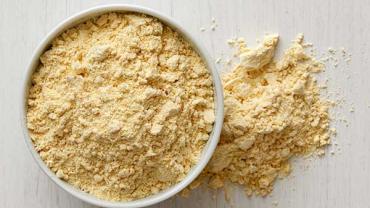
Countless individuals experience health benefits from shifting their macronutrient intake to decreased refined carbohydrates and increased dietary protein. However, people with hectic schedules and multiple daily commitments may not want to spend extra time in the kitchen grilling steak, roasting a chicken, or searing salmon, not to mention the increasing numbers of people eschewing animal protein altogether. Pea protein is a protein source that can benefit vegetarians, vegans, and omnivores alike, and research shows it doesn’t have to take a backseat to other more widely recognized sources, such as whey, in terms of efficacy.
Pea protein may be especially helpful for those with an allergy or sensitivity to dairy-based components (whey and casein), especially among individuals with compromised gut and immune health. These issues make these popular sources of protein powder off limits to a large number of people. Soy is another commonly available non-dairy protein source, but soy carries its own undesirable attributes, such as genetic modification, allergenicity, poor digestibility, and its researched roles in disturbing thyroid function and hormone balance. With these two main players out, consumers are left with novel proteins such as hemp, egg (which is also allergenic to many), rice, quinoa, or … peas.
Body Composition and Strength
Owing to its wide availability and cost-effectiveness, pea-based protein is often the go-to choice for individuals avoiding whey and soy. But this shouldn’t imply that it’s an inferior source of protein. Both whey and pea protein are rich sources of branched chain amino acids (leucine, isoleucine and valine), which are especially useful in promoting muscle repair and synthesis. Traditionally, whey protein has been the gold standard for athletes, but research shows that pea protein should hold a position of equal value. In a double-blind, randomized, placebo-controlled clinical trial of 161 males aged 18 to 35 years, subjects were given whey or pea protein or placebo for 12 weeks while participating in resistance training. At the end of the study, muscle strength and thickness were significantly increased in the groups supplemented with protein, and there was no difference between those supplementing with either whey or pea protein. The same results were noted in an 8-week pilot study of 15 subjects (men and women) who participated in high-intensity functional training while consuming 24 grams of either whey or pea protein. The groups showed similar increases in measurements for body composition, muscle thickness, force production, and workout performance and strength. Clearly pea protein is an alternative of equal value to whey protein for improving body composition and strength.
Blood Pressure and Kidney Health
Pea protein may be a preferred source of protein for individuals struggling to maintain healthy blood pressure. Hydrolyzed pea protein yields bioactive peptides that have been shown to inhibit angiotensin converting enzyme (ACE) and demonstrate antioxidant activity, which can assist in regulating blood pressure. In 2011 a randomized controlled trial tested the effects of pea protein on hypertensive rats and humans. In this study, hydrolyzed pea protein inhibited renin and ACE by 17 and 19 percent, respectively. When given to hypertensive rats, systolic blood pressure was lowered by 19mmHg at 4 hours. When Han:SPRD-cy rats (representing a model of chronic kidney disease) were given hydrolyzed pea protein over a period of 8-weeks, systolic and diastolic blood pressure were reduced by 29 and 25 mmHG, respectively, plasma concentration of angiotensin II was lower, and renin levels were reduced by 50 percent. This study concluded with a 3-week randomized double blind placebo-controlled crossover human intervention trial that also showed systolic blood pressure reductions of 6 mmHg. Since blood pressure is a primary risk factor for chronic kidney disease, hydrolyzed pea protein may aid in protecting kidney health.
Cholesterol-Lowering Effects
Unlike dairy-based protein powders, pea protein has been shown to reduce cholesterol when consumed with soluble fiber. A 28-day animal study sought to determine the effects of either pea protein or casein on cholesterol levels. Reductions in hepatic cholesterol were seen in the pea protein groups when combined with soluble fiber and were more efficacious than fiber alone. Additionally, the pea protein groups showed higher hepatic mRNA concentrations of CYP7A1 and NTCP, which are genes involved in hepatic cholesterol turnover.
Gut Microbiota
Perhaps one of the most enticing health benefits of pea protein is its ability to positively modulate the gut microbiota. Pea protein is high in lysine, making it susceptible to glycation and increasing its bioavailability. Glycated pea protein has been shown to significantly increase Lactobacilli and Bifidobacteria resulting in increased production of short chain fatty acids. Glycated pea protein also improved bacterial adhesion to enterocytes. Collectively, these effects positively modulate the gut microbiota, which can have far-reaching health benefits.
Considering the various health benefits of pea protein, this convenient and effective protein source need no longer be considered a second-rate supplement. On the contrary, pea protein is a wise choice, particularly for those with sensitivities to other protein sources.